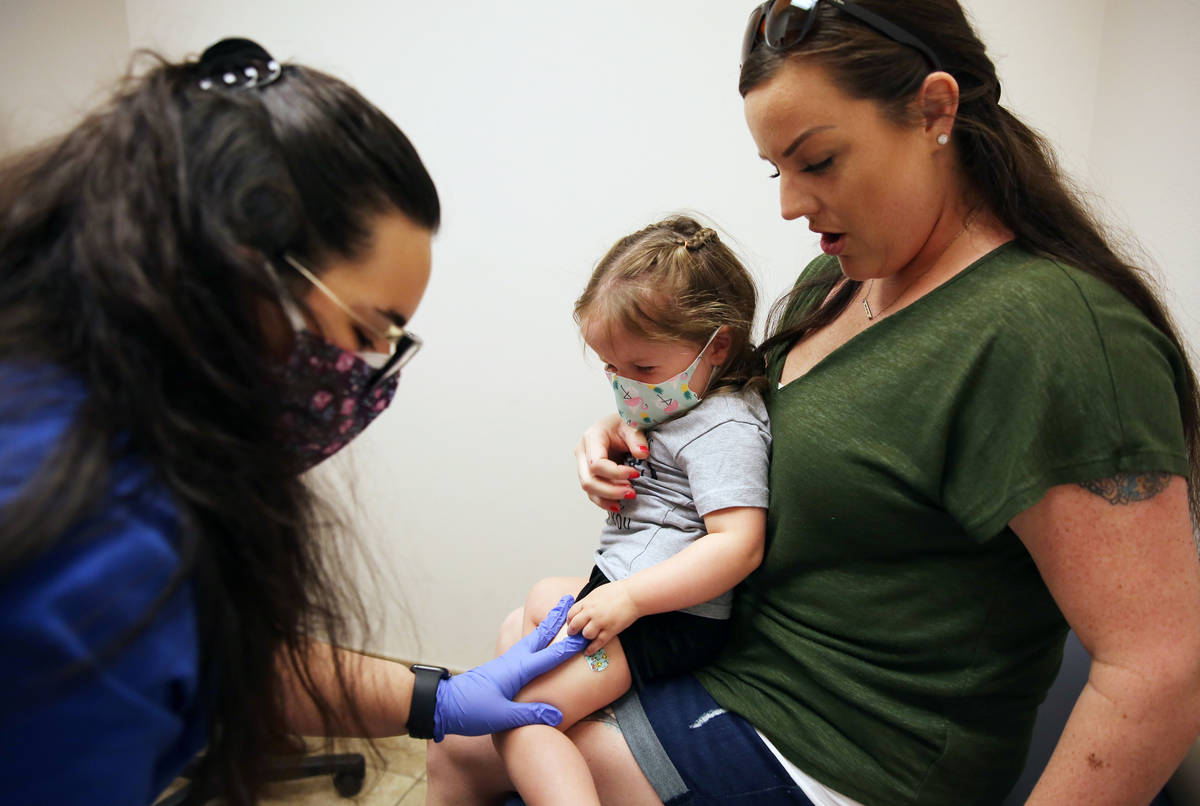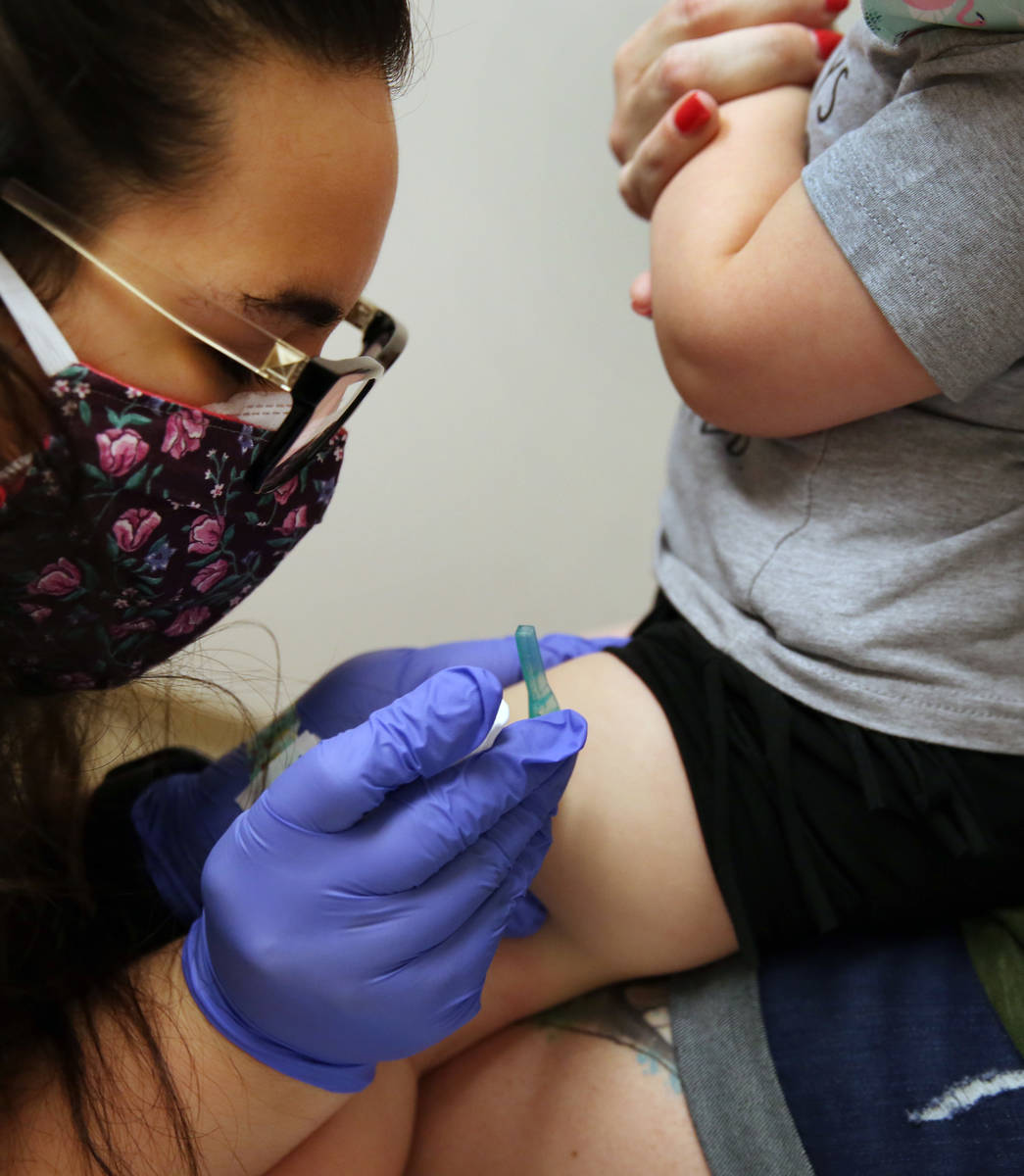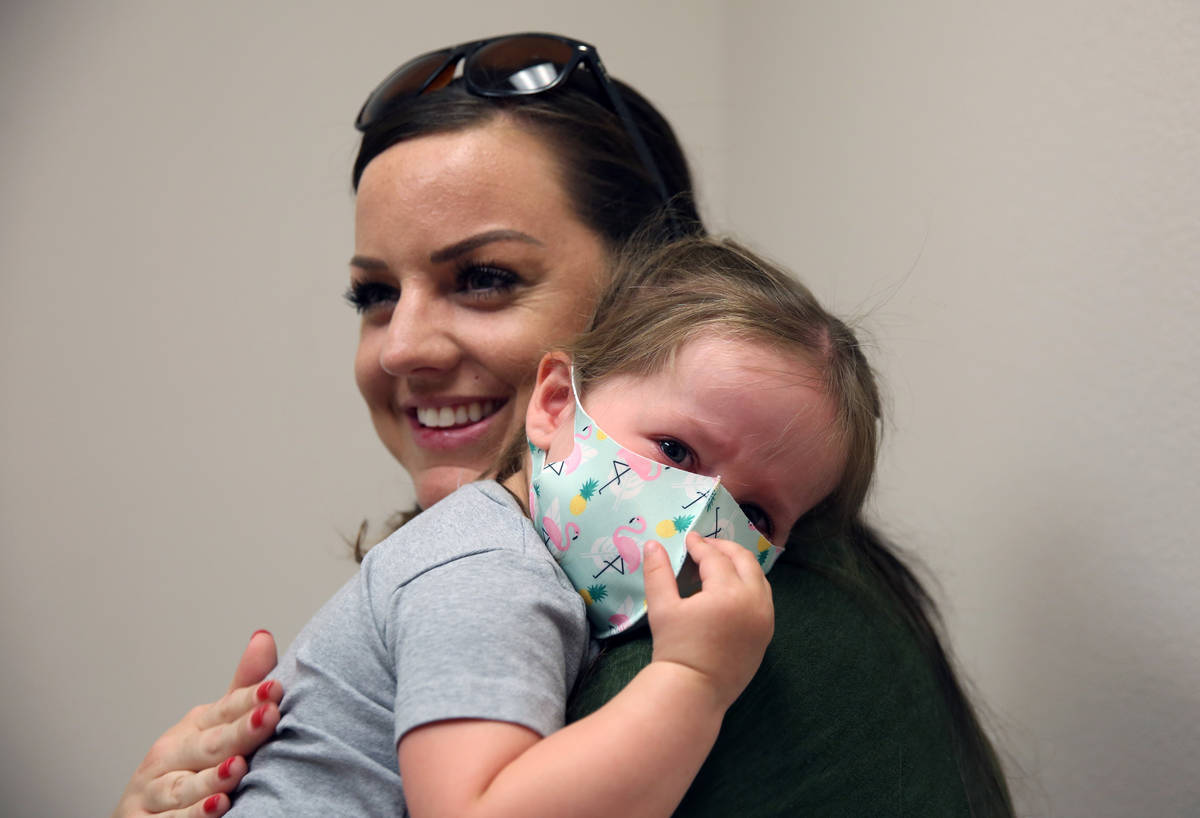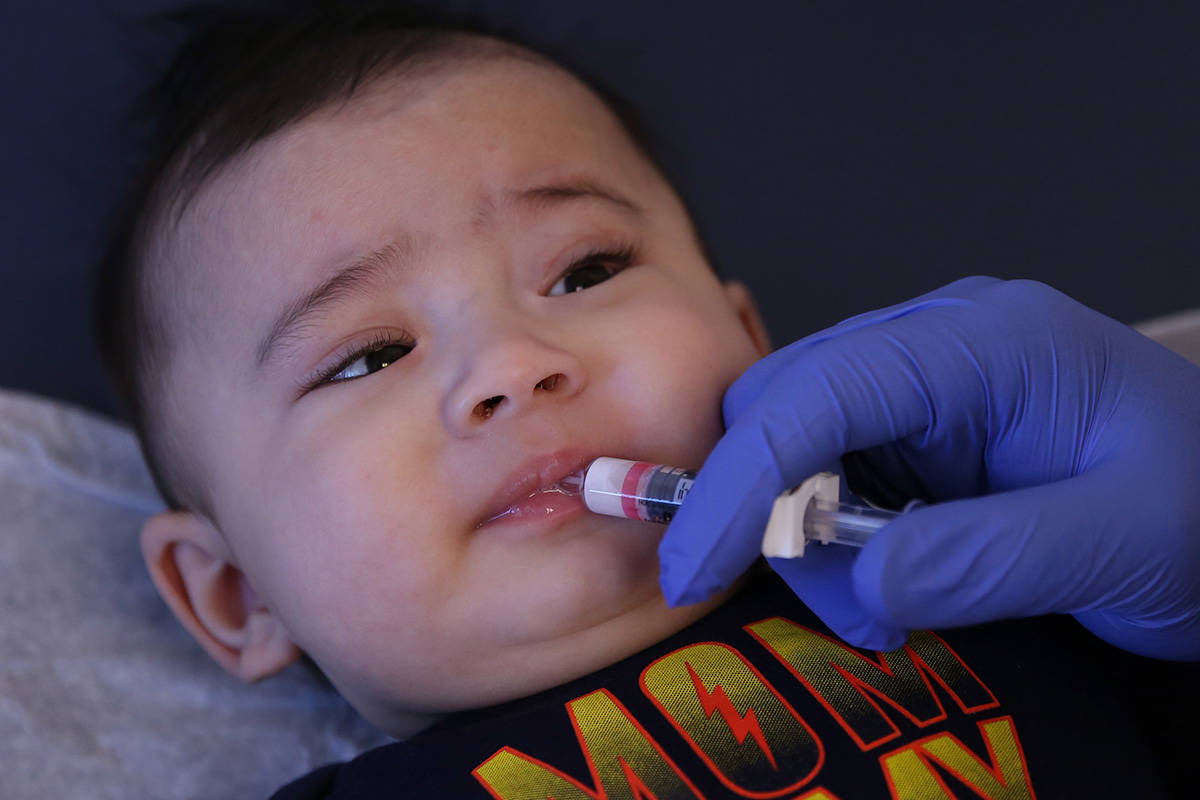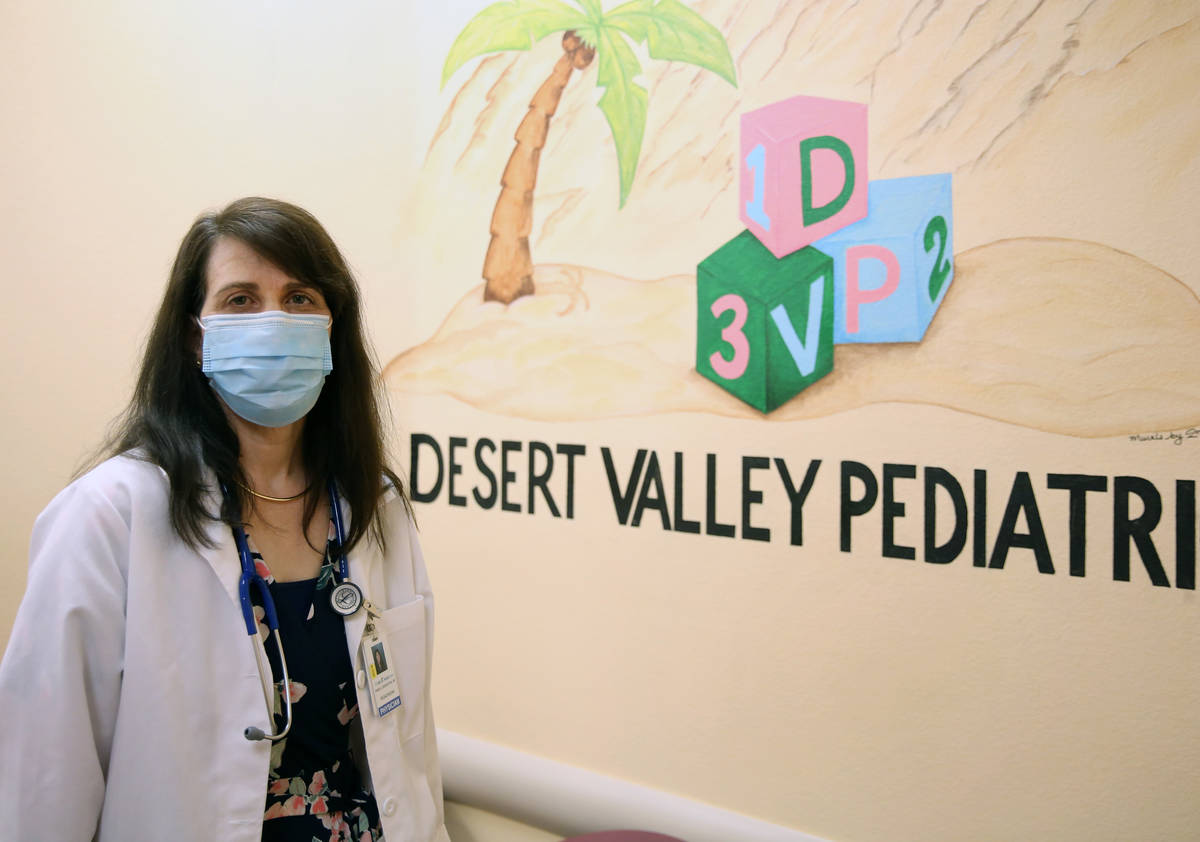Even amid pandemic, routine vaccinations still needed for children
It would have been easy for Amanda Hippert to find a reason to skip the trip to her pediatrician’s office for daughter Olivia’s latest round of vaccinations.
The biggest one: the coronavirus pandemic and Hippert’s understandable reluctance to expose her 2-year-old to whatever viruses might be lurking out there.
But Hippert decided to take Olivia in anyway. “Honestly, the concern is there,” she said. “But it’s not going to deter me from getting the proper care that she needs to protect herself.”
However, as Nevadans spent several weeks staying home, socially distancing and putting their lives on hold, the number of routine vaccinations Nevada children received plunged dramatically. According to Nevada WebIZ, a statewide immunization information system, the number of childhood vaccine doses given this year versus last year dropped 34 percent the third week of March and 45 percent the following week. Declines continued in April, hitting 48 percent the second week of that month.
The number of Nevada vaccinations has begun to climb again gradually over the past several weeks, but the trend raises the possibility of a backlog of vaccinations before school begins in just over three months, or even — a worst-case scenario — the possibility of new outbreaks of measles, whooping cough or other vaccine-preventable diseases.
National trend
Nevada’s numbers mirror a national trend. According to a May 8 article from the U.S. Centers for Disease Control and Prevention’s Morbidity and Mortality Weekly Report, a “notable decrease” in ordering childhood vaccines began in mid-March.
While there is no vaccine for the novel coronavirus, the “ongoing COVID-19 pandemic is a reminder of the importance of vaccination,” the authors wrote, and as “social distancing requirements are relaxed, children who are not protected by vaccines will be more vulnerable to diseases such as measles.”
One reason for the drop in vaccinations here may be a dialing back of services in doctors’ offices as physicians altered practices — including thinning waiting rooms and adding more time to disinfect facilities throughout the day — to prevent coronavirus transmission among patients.
Dr. Fermin Leguen, acting chief health officer for the Southern Nevada Health District, said even the district’s immunization clinic reduced its caseload to prevent overcrowding. However, he said, the clinic remained open to offer vaccinations to children who were due for their next shots.
Heidi Parker, executive director of Immunize Nevada, said another reason for the drop may have been “uncertainty about whether visits were essential or if you should just be going to a doctor if you’re sick.”
Also, some parents simply may have been reluctant to take children to the doctor’s office. For Hippert, the risk of taking Olivia out in public was outweighed by the risks of her falling behind on her vaccinations.
Hippert said she works full-time while Olivia goes to day care, “so she’s going to be out and exposed, I’m going to be out and exposed, and if it’s going to protect her, I’m going to do it.”
Preventing outbreaks
Pediatrician Dr. Pamela Greenspon said there were cases of measles and whooping cough in Nevada last year, “and we occasionally still see varicella or chicken pox.” Delaying or postponing scheduled vaccinations might expose children to such diseases, all of which are preventable.
“We don’t want another crisis on top of the COVID-19 epidemic,” she said.
Dr. Thomas Hunt, chair of Roseman University College of Medicine’s family medicine department, noted, too, that vaccinations can’t be administered via telehealth or other coronavirus-prompted changes in medical practice adopted in recent weeks.
So, Hunt said, “no doubt kids have fallen behind in vaccinations the last two months.”
Vaccinations are administered at various ages beginning in a child’s infancy. Among the vaccines on the CDC’s schedule are those for hepatitis A and B, varicella (chicken pox), pertussis (whooping cough), rubella, diphtheria, polio, measles, mumps and tetanus.
All are aimed at preventing illnesses that “used to have children in the hospital,” Greenspon said. “That’s why it’s so critical that children get vaccines on time, so we can protect them from some very serious diseases.”
Not having vaccinations also jeopardizes other children’s health by reducing herd immunity, “where there are enough patients in the population that are protected against a disease so that those people who cannot get the protection (through vaccines) will be protected,” Greenspon said.
Back to school
Schools, preschool and child care facilities also require that students’ vaccinations are up to date. And with at least some area physicians expecting to experience a backlog of rescheduled appointments in the coming weeks, it’s not too early to visit now.
“We always encourage children to get vaccinated whenever it’s appropriate for their age,” Greenspon said. “We don’t want to rush in at the beginning of August or the week before school starts.”
“Usually we get very busy four to six weeks before school starts, with people coming to get caught up,” Hunt said.
At the same time, “one thing we may be seeing is people losing their jobs and losing insurance, and they may not think they can get vaccines,” Greenspon said.
Nevada Vaccines for Children — vfcnevada.org — helps to provide vaccines at no charge to uninsured parents or guardians who can’t afford them. And, Parker said, “a lot of pediatricians are involved in this program.”
Meanwhile, parents who are concerned about taking their children to a doctor’s office should talk to their physicians about measures that have been taken to protect families, Greenspon said. “Pediatricians have always been here for children and their families, and we’re going to continue to be here for children during the COVID-19 pandemic,” he said.
A clear message
“Now is a really good time to go to your practice because they do have appointments available,” Parker said.
“I think it’s pretty clear COVID-19 is going to be around with us for a little bit, so we want to make sure we stay on top of the diseases we do have vaccines for,” Parker said.
COVID-19, she added, “is a reminder for all of us of the challenge of fighting the deadly diseases which you don’t have a vaccine for.”
Contact John Przybys at jprzybys@reviewjournal.com. Follow @JJPrzybys on Twitter.
Stay informed
Immunize Nevada (immunizenevada.org) offers a variety of information about immunizations on its website, including links to community health centers and clinics where uninsured parents may obtain vaccines for their children.
The page also offers links to information about school immunization requirements (immunizenevada.org/NVSchoolRequirements).
Contact the Nevada Vaccines for Children program at vfcnevada.org.




